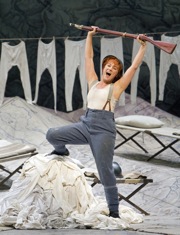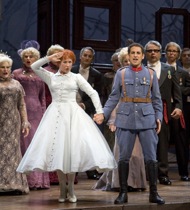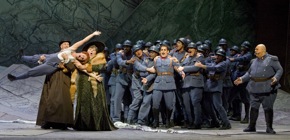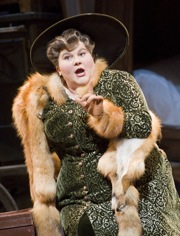On the surface, Daughter, which the San Francisco Opera titles in English but performs in French, is a delicious sing-fest indeed. And this in the context of a production that willfully strips away the gold braid, red serge, shimmering satin, and brass buttons traditional for this opera, resetting the action instead in the gray realm of World War I. Marie, the heroine adopted as a baby by the entire 21st regiment of the French army, sports not a smart uniform but drab trousers, a tank top, and a pigtail.

Photos by Cory Weaver
Laurent Pelly — the director here, as for this production at the Metropolitan Opera, Covent Garden, and Vienna — has called upon Chantal Thomas for settings that frame costumes of his own design. The action unfolds on a unit set backed by giant maps of the campaign, maps that spill across the stage as the surface of a stylized topography. The strict choreography in which chorus and characters react to events and move across the stage, mimicking rhythms of the music, recalls Jean-Pierre Ponnelle’s productions here during the 1970s. (His La Cenerentola especially comes to mind.)
Pelly’s staging demands extraordinary athleticism from Diana Damrau, who, as Marie, must haul a clothesline draped with long johns,

and Juan Diego Flórez (Tonio)
heft a tub of potatoes, and engage in acrobatics worthy of a gymnastics team. How many sopranos can dive into this technically and emotionally intricate music in such positions — including high notes sung while aloft, horizontally, on the arms of a troop of soldiers?
Damrau flings herself with equal fervor into the coloratura of Marie’s vocal flights. In the upper register, she commands the necessary brilliance of tone and technical security. Her middle and lower ranges perhaps lack the bright character ideal for this role, but her portrayal as a whole is as dazzling as it is moving.
Daughter is the soprano’s opera, but its centerpiece in recent years has become the aria “Ah, mes amis” (Ah, My friends) in which Tonio, the Tyrolean hero, embraces a post in the French army in order to win Marie, his beloved. The gold standard for this aria, with its tight sequence of nine high Cs, has been Luciano Pavarotti’s 1972 performances at the Met. In recent years, appearances by Juan Diego Flórez in this production and others have brought audiences to a frantic enthusiasm that recalls Pavarotti’s reception. For Flórez, La Scala and the Met even waived their long-standing policies forbidding encores. Do your own comparisons on YouTube (Pavarotti; Flórez).
No encore in San Francisco, at least yet, though Flórez sang “Ah, mes amis” to perfection. But a great tenor is more than high Cs (Domingo never even had the note), and Flórez is superb on all of the classic criteria. His voice maintains even scale and tone on every note and at every volume. The passage across notes is seamless. He deploys all of this technical prowess to take the music he sings straight to the heart of each listener.

The raucous, farcical athleticism of the staging underlines, oddly enough, this opera’s undercurrent of authentic feeling at crucial moments when Donizetti imports the romantic lyricism of his serious operas. In these passages, he approaches Bellini as a melodist. Most striking, and most moving, are Marie’s aria “Il faut partir” (I must leave), her farewell to the regiment at the close of Act 1, and Tonio’s “Pour me rapprocher de Marie” (To be near Marie). The beauty and sincerity of this emotional outpouring deflect Marie’s aunt, the Marquise of Berkenfeld, from her determination to force the girl into an absurd aristocratic marriage. (It does all work out, as you might imagine.) Flórez brought such profound musicality to this song that it became the high point of the evening.
Supporting singers, led by Bruno Pratico’s capable Sulpice, entered freely into their delightfully wacky assignments. Meredith Arwady's grand flauntings as the Marquise

(The Marquise of Berkenfeld)
Photo by Terrence McCarthy
included marvelous belting tones that did honor to the memory of Ethel Merman. Sheila Nadler, who first sang with the company in 1968, headed the charge of the old guard in the speaking role of the Duchess of Krakenthorp.
General Director David Gockley’s experiment this season with young debut conductors has paid off handsomely with Andriy Yurkevych’s crisp and buoyant leadership. He evoked lovely playing from the orchestra and caught both the comedy and the heartfelt sentiment of this opera. Occasional slips in coordination divided the pit from the stage — oddly enough in two different entries of the rhythmically strict “Rataplan” march that recurs as the 21st regiment’s theme song.
This production of Daughter of the Regiment tries too hard for laughs and plunges at times into sheer frenzy, but it opens space for the profound feeling that separates this opera from mere buffa and marks it as a treasure. Clearly the audience left with a warm glow.

